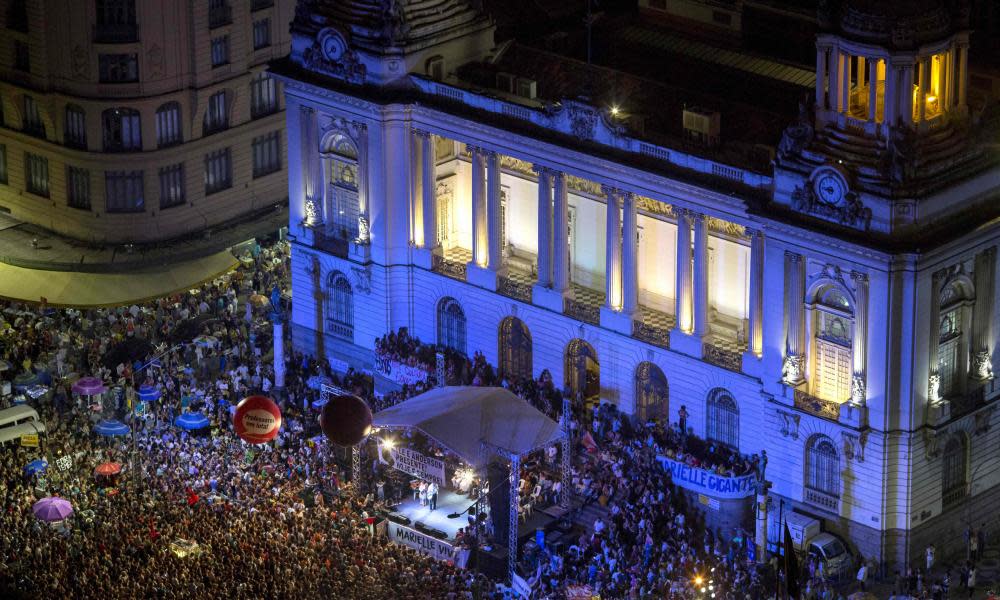Marielle Franco murder: Brazilian authorities under global pressure to find killers

As pressure grows on the authorities in Brazil to find the killers of Rio de Janeiro councillor Marielle Franco, an open letter by international activists, writers, journalists, film-makers, politicians and actors has called for an investigation of her murder by an independent commission.
Franco and her driver were shot dead on 14 March, in a targeted assassination which unleashed a wave of anger across Brazil, and provoked urgent debate on the country’s racism, violence and impunity.
The human rights activist from Rio’s Maré favela complex had denounced killings blamed on police and was in charge of a city council commission monitoring the Brazilian government’s “federal intervention” which put the military in charge of policing in Rio state.
“She vehemently challenged the impunity surrounding extrajudicial killings of Black youth by security forces,” write the authors of the letter, published in the Guardian and O Globo. “Marielle’s activism earned her many powerful enemies.”
Chimamanda Ngozi Adichie, Ava DuVernay, Arundhati Roy, Angela Davis, Edward Snowden, Glenn Greenwald, Black Lives Matter co-founders Patrisse Cullors and Opal Tometi, Naomi Campbell, Noam Chomsky, and actors Thandie Newton, Gael García Bernal and Narcos star Wagner Moura are among the signatories.
“Given that Marielle’s assassination bears all the hallmarks of a targeted assassination, we call for the creation of an independent commission comprised of prominent and respected national and international human rights and legal experts and tasked with carrying out an independent investigation,” they wrote.
As the letter noted, two days before her murder Franco had denounced the police’s role in the killing of a young black man named Matheus Melo, who was shot dead after leaving an evangelical church service in the Jacarezinho favela.
She had also criticised Rio’s 41st police battalion – which has been linked to numerous killings – or “terrorising and abusing” residents of the Acari favela, where two men were killed and thrown into a drainage ditch on 5 March.
The Intercept Brasil has reported that one line of inquiry involves “militias” – mafias whose members include serving and former police officers. In 2008 Franco worked on a city council commission into militias in Rio.
Rio police said they would not comment on an ongoing investigation.
Homero Freitas Filho, who leads a team of prosecutors also working on the investigation, told the Guardian that Franco’s killing was believed to be connected to her political work and denunciations.
“No hypothesis will be discarded but this is the principal one,” he said, adding that he had recently requested and been given five extra prosecutors.
Local media have reported that Franco and Gomes were shot through the back window when a car drew up near theirs. Her press assistant, who was with Franco on the back seat, described a rapid burst of fire in an anonymous television interview.
The 9-millimeter bullets came from a batch stolen from federal police in 2006, some of which were also used in a massacre in Osasco, near São Paulo in 2015, in which 17 people were killed. Three police officers and a municipal guard have been convicted of homicide in the case.
Freitas Filho said that 1.8m bullets were stolen in the robbery. “They could have been distributed to all kinds of criminals,” he said.
Her killers – who had followed her from a meeting in two cars – also chose a “blind spot” where street cameras were not functioning. Since the murder, the site has become a shrine, with flowers, pictures and graffiti reading “police kill”, “execution” and “Black lives matter”.
This week, Pope Francis called Franco’s mother, Marinete da Silva.
Last Sunday about 5,000 people marched in her memory in the Maré favela complex she was from. On Tuesday night thousands more paraded through central Rio streets, filling the square in front of Rio’s municipal chamber and singing along to music played by an orchestra.
Many in the crowd were black Brazilians from lower-income communities. Street vendors had decorated their cool boxes and stalls with stickers and posters with Franco’s name. “It’s important for black people to be here,” said Pedro Vidal, 26, a nurse. “We won’t accept this and we won’t let it pass.”

 Yahoo News
Yahoo News 
